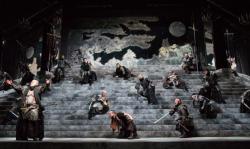Cymbeline

by William Shakespeare (Yukio Ninagawa’s production at the Barbican, London, 29 May 2012 to 2 June 2012)
Review by Susan Meehan
I was expecting this version of Cymbeline to display Yukio Ninagawa’s trademarks – unparalleled stage scenery, plush costumes and a magical ending. I was not disappointed. However, having recently enjoyed 11 Shakespeare plays during the Globe to Globe season in which the 37 plays were performed in different languages by 37 international theatre groups, I had come to appreciate the understatement and simplicity of the Globe’s stage and the actors’ costumes. Unexpectedly, I found Ninagawa’s sets and exquisite costumes to be somewhat excessive and unnecessary and was more critical than I had intended or wished.
The play, part of the World Shakespeare Festival, breathtakingly opened with the actors sitting down before dressing table mirrors, getting ready to perform, moving across the stage and chatting to one another. This magical set disappeared all too soon as the actors lined up to bow to the audience and had no tie-in to the rest of the play.
Cymbeline is set in Britain and Rome in the early first century, during the reign of Augustus Caesar, Emperor of Rome, and Cymbeline, King of Britain. Majestic statues of two wolves associated with the rearing of Romulus and Remus adorned the stage when the action was in Rome along with beautifully elaborate Japanese folding screens depicting scenes from the Tale of Genji.
Cymbeline’s first wife died when his three children, a girl (Innogen) and two boys, were very young. He remarries. Cymbeline’s second wife hopes that her son, Cloten, will marry Innogen who is the king’s heir while his two sons, kidnapped when they were very young, are not found. The scheming queen is a wicked stepmother and on a par with evil Lady Macbeth.
Innogen secretly marries her childhood friend Posthumus. Orphaned as a baby, he was brought up by Cymbeline. The king, furious that Innogen has married below her status and supporting the queen in her wish for Cloten to marry his daugher, has Posthumus exiled.
Posthumus was wonderfully played by the handsome and charismatic Hiroshi Abe while Innogen was played by fifty-four year old Shinobu Otake. This was a brave decision given that this role is normally saved for actors in their youthful prime.Innogen had a lot to say; sadly she did so very quickly in rapid machine-gun style, failing to declaim her words with much feeling or poetry.
Cloten tries to woo the heartbroken Innogen with, unsurprisingly, no success. He is an incompetent fool. Masanobu Katsumura played him expertly as a goofy Mr Bean-style clown with an unflattering mop of hair, clumsy and unable even to unsheathe his sword. The best scene has him sliding round the stage like a penguin on ice – a veritable jester, which I’m not sure is what Shakeaspeare had in mind.
In the lush Roman setting to which Postuhmus has fled, he falls in with the friends of his host Philario who begin talking about women. Iachimo, one of these friends, is offended that Posthumus in extolling Innogen praises her above Roman women. A wager is made – Iachimo will travel to Britain and make Innogen fall in love with him. Postuhumus, so confident of Innogen’s fidelity, promises to given Iachimo his diamond ring if Iachimo succeeds in wooing Innogen.
Iachimo was portrayed as a cackling somewhat exaggerated villain by Yosuke Kubozuka. He inveigles his way into spending a night hidden in a trunk in Innogen’s bedroom and is able to commit the room to memory, to slip off Innogen’s bracelet while she is asleep (which he’ll say she gave him as a token of her love) and to notice a distinguishing mole on her breast.
The second half of the production was an improvement on the first. It became tenser and compelling when Pisanio, Postuhumus’s servant at court in Britain, having led Innogen to Milford Haven tells her that Posthumus wants her killed for her infidelity. Dressing Innogen in men’s clothes, Pisanio, played with genuine style and affection for the part by Keita Onishi, says that she’ll be safer as a man. He encourages her to serve Caius Lucius, a general of the invading Roman army. A distraught and confused Innogen is grateful for this idea as she can then follow Lucius to Rome where she can keep an eye on Posthumus.
As Innogen wanders into the distance disguised as the lad Fidele, a lonely figure in the huge wooded landscape , the simple setting works extremely effectively. Otake is a much better Fidele than Innogen.
The play concludes on a positive note as all is resolved and the evil get their come-uppance. Finishing with the promise of Britain’s future peace and plenty, this was certainly the perfect play for Ninagawa to stage during the Queen’s diamond jubilee year with forgiveness and clemency, important values in these fraught times, being the play’s overriding message.
A hugely enjoying evening but perhaps Ninagawa’s Cymbeline fell short of his Twelfth Night, Pericles, Titus and Andronicus and Hamlet.

